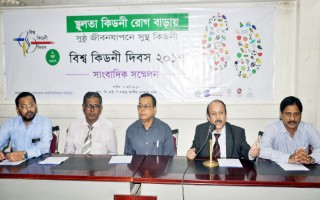Most kidney patients cannot afford treatment
The World Kidney Day will be observed in Bangladesh today with kidney patients facing a bleak situation as most of them cannot afford the costly treatment of regular dialysis in absence of adequate government facilities.
There are only 13 government-run dialysis centres and 135 private ones in the country while about 2 crore people are suffering kidney diseases with 40,000 in need of regular dialysis or transplantation.
About 35,000 citizens loss kidneys every year and most of them have to wait for death as people in the country do not donate kidneys posthumously, a major source of kidneys for transplantation in developed countries.
Some 100 kidney transplantations occurred in a year in Bangladesh, but these are only by hazarding others’ life.
Against this backdrop, Bangladesh is going to observe World Kidney Day 2017 today, calling for awareness of healthy lifestyle.
This year the day is being observed with the theme - Kidney Disease and Obesity: Healthy Lifestyle for Healthy Kidneys.
There is no government statistics of kidney patients, but Directorate General of Health Services director for non-communicable disease Faruk Ahmed Bhuyan said that about 2 crore people were suffering from kidney diseases and 40,000 of them were suffering from with chronic kidney disease who needed regular dialysis or a transplantation.
He said that chronic kidney disease accounted for 60 per cent of deaths in Bangladesh.
National Health Bulletin 2016 showed that among the top causes of death at medical college hospitals in 2015, kidney disease was placed sixth.
Kidney disease was also placed seventh among the causes of death at district level hospitals in 2015.
National Institute of Kidney Diseases and Urology professor Kazi Sahanoor
Alam said that there were 13 government-run dialysis centres – at the institute, 10 medical colleges, Bangabandhu Sheikh Mujib Medical University and Shaheed Sheikh Abu Naser Specialised Hospital in Khulna – and 135 private dialysis centres in the country.
Faruk Ahmed Bhuyan said that the government-run dialysis centres took Tk 400 for a single dialysis, but the facilities were not adequate.
Only 15 to 20 per cent of the 40,000 people can afford dialysis due to lack of government facilities and high cost in private facilities, said Kidney Foundation Bangladesh president Harun-Ur-Rashid.
A single dialysis costs about Tk 1,600-5,000 at private facilities, while a patient need two-three dialysis in a week, he said.
Kidney Awareness Monitoring and Prevention Society president MA Samad said that at least two dialysis centres should be installed in every district.
He said that Japan with 12 crore population had over 3 lakh dialysis centres while Bangladesh had a few more than one hundred.
The government should install dialysis centres or rebate taxes on the import of machineries and other equipment so that the private sector could offer low-coast dialysis, he said.
Harun warned that the country was going to take enormous burden of kidney patients in the coming years.
He said the country’s population were increasingly becoming vulnerable to diabetes and hypertension – two major causes of kidney diseases.
There are about 80 lakh people with diabetes while 2 crore people are suffering from hypertension.
‘To kidney disease, diabetes has a 40 per cent more risks and hypertension has 25 per cent more risk’, Harun said.
He said that the government was not prepared to tackle the burden.
Harun said that early detection could delay the kidney disease and government run community clinics and upazila health complexes should be equipped with conducting two tests – microalbumin in blood and urine and creatinine in blood to determine about kidney disease.
People over 40 should undergo these tests twice a year, he said.
Samad said that there were only 120 nephrologists in the country who could not treat the huge number of kidney patients.
Kidney patients often go to doctors with 70 per cent of kidney collapsed, because the disease goes silently, he said.
About 60 per cent of the deadly kidney diseases could be prevented maintaining healthy lifestyle – checking obesity, overweight, taking healthy foods and regular physical activities, Samad said.
According to Kidney Foundation, against the yearly need of 20,000 kidney transplantations, about 100 kidneys are transplanted in the country a year but only by hazarding lives of others.
‘Taboo of dissecting body after death prevents posthumous kidney donation in Bangladesh,’ said Harun, adding that about 80 per cent kidneys were transplanted through posthumous donations in the United States and European countries.
State authorities conduct those transplants, he said. Islamic countries like Iran and Saudi Arabia also follow posthumous kidney donation, he added.
Faruk said that the government had a plan to equip upazila health complexes and 15,000 community clinics with screening facilities and district level hospitals with dialysis facilities.
He said the government would launch campaign to aware people about the causes of non-communicable diseases like diabetes, hypertension, cardiovascular disease and kidney disease.
- See more at: http://www.newagebd.net/article/10801/most-kidney-patients-cannot-afford-treatment#sthash.kZbdTFkT.dpuf











